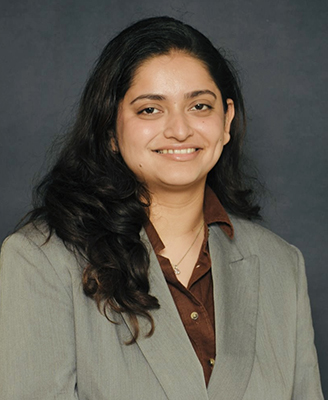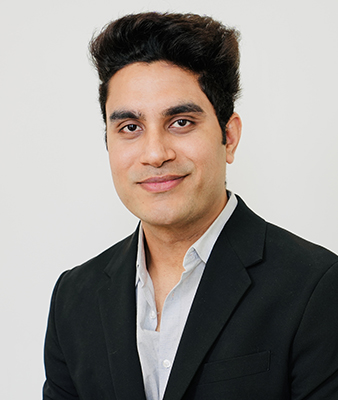Apr 16, 2025
Gies startup SheHeal giving women resources to support mental health
Editor’s Note: The Cozad New Venture Challenge provides University of Illinois startups with an opportunity to compete for a pool of $500,000 in funding. Gies College of Business is a co-sponsor of the 2025 event, and this year, 57 Gies-led teams are participating in the contest, up from seven in 2024. This is one in a series of features on Gies teams participating in this year’s Cozad, which culminates in the finals on April 17.
When Akshita Arora learned that women are twice as likely to face depression as men, she was motivated to help find a way for women to cope with their mental health issues.

Arora, who is pursuing a master’s degree in business analytics at Gies, is developing an app which she hopes will be a central hub for help.
The app, called SheHeal, will include self-help features like meditation, a large language model (LLM) generated chatbot, and a directory of localized therapists and certified professionals. It will include the ability to book an in-person appointment with a therapist or doctor. Those that sign up will also receive daily “peaceful motivating” quotes.
About 75 percent of women face mental health problems by the age of 24, but very few people talk about their mental health because they feel it is a stigma,” Arora (left) said. “Part of our startup is a chatbot, where you can anonymously tell it what you are feeling, and the bot will be able to make suggestions about what you can do to manage the issues. The solutions will be backed by health care professionals.”
Arora and her business partner, fellow Gies master’s student Aamish Samotra, have received valuable guidance from Sridhar Seshadri, a professor in business administration at Gies. The duo approached Seshadri with the idea as part of their Healthcare Process Management class.
“He helped us in exploring more about it, pointed us to resources and apps in this space, and shared the difficulties the apps are having,” Samotra said.
Arora holds an undergrad degree in computer science, while Samotra has a background in mathematics and management and launched an educational technology startup in India as well. They both credit their experience at Gies with preparing them for this venture.
“The professors here have great insight into analytics and Big Data, which has been valuable,” Arora said.
“We are not only learning how to code, but we are understanding the problem and what business insight we can make out of it,” Samotra added. “Those insights can only be gained through a high-level business school like Gies.”
Through its Origin Ventures Office of Entrepreneurship, Gies College of Business is supporting entrepreneurial activities of both on-campus and online learners. The Origin Ventures Office fosters knowledge creation and dissemination from top faculty in the field, and it designs and offers the curriculum needed to bring that knowledge to the classroom. The office houses iVenture, an accelerator for top student startups at the University of Illinois, and co-sponsors the Cozad New Venture Challenge.

SheHeal is one of 310 teams, 57 of which are Gies-led, competing in Cozad, which will award more than $500,000 in funding at its finals on April 17. Whatever funding they receive, Arora and Samotra (right) have gained two valuable experiences through the competition. They are one of only 12 teams selected to work toward a trademark and one of nine teams selected to chat with YouTube co-founder and University of Illinois alum Steve Chen.
In addition, they say that Cozad has given them guidance on their product and the next steps.
“We have finalized the name of the product, applied for a trademark, and have received so much free assistance from high-level professionals, many of whom have had their own startups,” Arora said.
Once they complete their prototype, they plan to apply for the Y Combinator, a three-month intense program with a goal of helping startups take off.
Arora admits that to drive traffic and gain a larger customer base, they may need to start with a free model, perhaps charging healthcare professionals a small subscription fee to be listed on the site.
Because many are still not open about talking about mental health issues, word of mouth becomes a little more challenging, but they plan to strategically use social media marketing to spread the word.
“There isn’t an app that we are aware of that has all of these services in one place, so we feel it fills a real need,” Samotra said.
